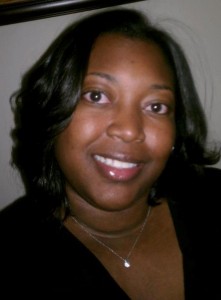*Meet Monica McKendrick*

This week I wanted to take a moment and go back to our career series. This time, we’re going to delve into the field of engineering. Because this is the field I work in, I can tell you that there are A LOT of different types of engineers who work in all types of industries. One such industry is the defense industry. It is made up of government and commercial entities that research and develop materials used by the military. Today, I’d like to introduce you to Monica McKendrick. She is an engineer who works in the defense industry. Here’s my interview with Monica:
What is your profession? I am a Systems Engineer.
What exactly do system engineers do? System Engineers focus on the overall system and how it is designed and managed over the entire life cycle. Systems Engineering integrates all the disciplines into a team effort that proceeds from concept to production to operation. Systems Engineers work on the business and technical side of the projects, and ensures that a quality product is delivered that meets the customers’ needs.
What made you want to get into that field?
I wanted to go into the field of Engineering because I had a passion for Math, Science and Technology as a child. I loved learning how to create things and the inner workings of devices. I always longed for understanding the “why” of everything. Engineering often goes to that level of detail in everything and that is why I love the field.
Describe your typical day.
A very basic description of my job is that I manage the entire lifecycle of products used by the military for training. This means that I am involved with everything from creating and managing the requirements used to produce software and hardware to build these training systems to helping maintain the product once it is delivered to the customer. I work very closely with those in other Engineering fields (Software, Hardware, etc.) and my typical day varies depending on what phase the project is in. Most projects follow the waterfall method, which is a sequential design process in which progress is seen flowing downward (like a waterfall). The waterfall method consists of the following phases:
1. Requirements Gathering – During this phase SEs are working a lot with the customer to ensure that everything is defined on what the system needs to do. This is when the requirements are written for the product and what the rest of the phases will follow to create the product.
2. System Design – During this phase, SEs work to design how the product will work. During this phase we have to keep in mind the requirements that were written to ensure we are meeting them.
3. Implementation – This is where the product is created. SEs often work with many other Engineering disciplines during this phase (Software, Hardware, Mechanical, etc.). Our job is to ensure that the products are being built to the requirements and specifications for the product.
4. Integration and Test – This is my favorite phase! Here SEs integrate the products together (if required) and test, test, and more test! Our goal is to test every aspect of the system to ensure that it is working as it should and all requirements are met.
5. Deployment – This is the phase where we provide the product to the customer. This often includes more testing with the customer to ensure that the product was built to their requirements.
6. Maintenance – Not all products require maintenance, but if so, this is the phase where SEs still work to ensure that any maintenance that is done still meets the customers’ needs.
Do you believe an advanced degree is necessary in your field?
No, I don’t believe an advanced degree is necessary, but I would recommend it. Engineering is a huge field, so obtaining an advanced engineering degree will allow you to focus more on a particular field.
Do you have an advanced degree? If so, how do you think it has impacted your career and the path that it has taken?
Yes, I have two advanced degrees – a Masters in Computer Science and an MBA with a concentration in management. I believe that the technical degree has helped me to gain a deeper understanding of engineering concepts, and the MBA has opened my mind to business and how things work outside of engineering. I believe the MBA will be a key to my success as I strive to make progress in my career.
Where do you see yourself professionally in ten years?
In ten years, I see myself as an Engineering Program Manager (PM).
What will you have to do to achieve this goal?
To achieve this goal, I will have to gain a better understanding of other areas, outside of Engineering, and how they contribute to the success of the entire programs. Those areas include Finance, Sourcing, Planning, etc. This is why I believe my MBA will be so useful in achieving this goal. If different from your current profession, why are you planning to make the switch to something new? Becoming a PM is not really stepping out of the Engineering field because most PM’s are Engineers. It does entail taking on more responsibility, working more on the business side of the program and working more closely with the customers to ensure their needs are met. PM’s not only focus on the Engineering aspect of a project, but on EVERYTHING about the project. Their goal is to ensure that a quality product is delivered, within budget, on time, and that all requirements are met.
What personality traits do you believe are good for an engineer to possess?
A person who is detail oriented, with good communication skills, and who works well on a team could possibly make a great engineer.
Do you have any advice for a young woman who aspires to work in your field? My advice would be to just study hard, learn as much as possible about all areas of Engineering, but to become an expert in the area you want to focus on. Engineering is still a male dominated field. Don’t let this deter you. Women make GREAT Engineers! 🙂
If you would like more information on the field of engineering, you can contact Monica at: monica.mckendrick@gmail.com
The first step in pursuing your chosen career is to obtain the proper education for that career. For those of you who are interested in engineering, here is a list of the top ten engineering schools according to US News:
Massachusetts Institute of Technology Cambridge, MA
Stanford University Stanford, CA
California Institute of Technology Pasadena, CA
University of California – Berkeley Berkeley, CA
Georgia Institute of Technology Atlanta, GA
University of Illinois – Urbana-Champaign Champaign, IL
University of Michigan – Ann Arbor Ann Arbor, MI
Carnegie Mellon University Pittsburgh, PA
Cornell University Ithaca, NY
Princeton University Princeton, NJ
(Source: http://colleges.usnews.rankingsandreviews.com/best-colleges/rankings/engineering-doctorate)
-Tiffany Vicks
facebook comments:



